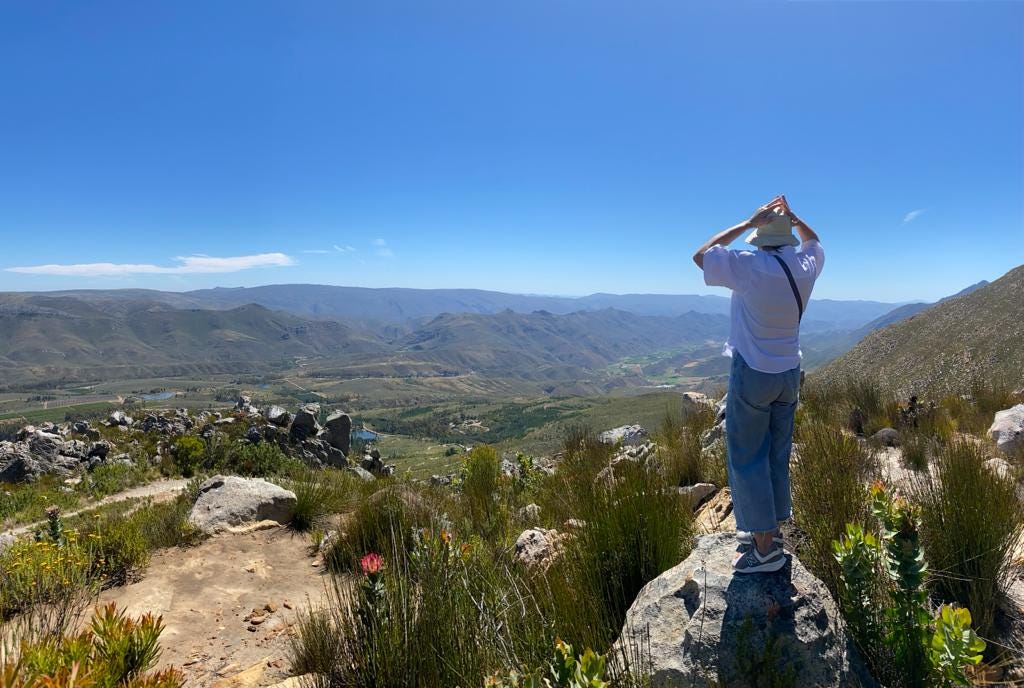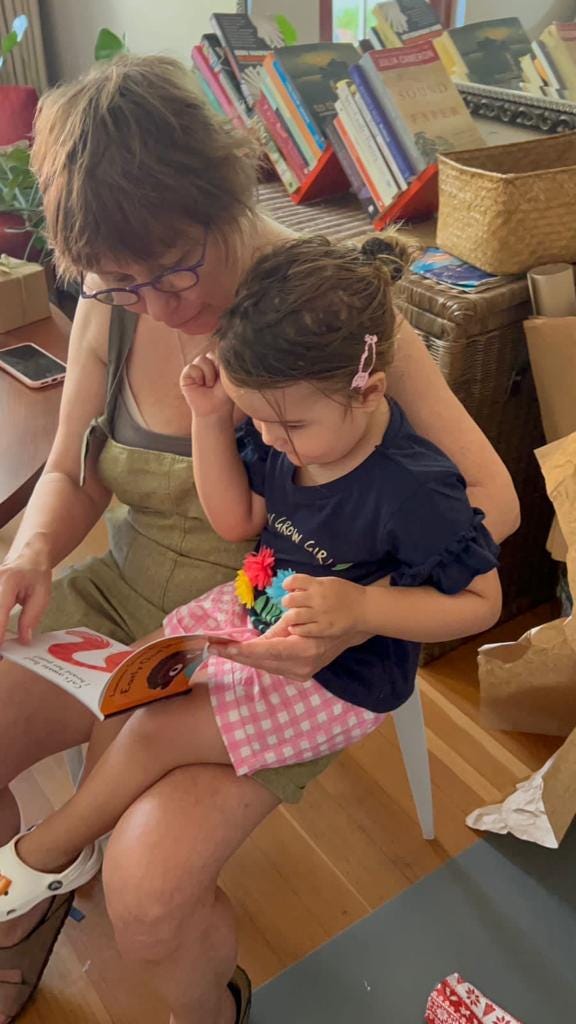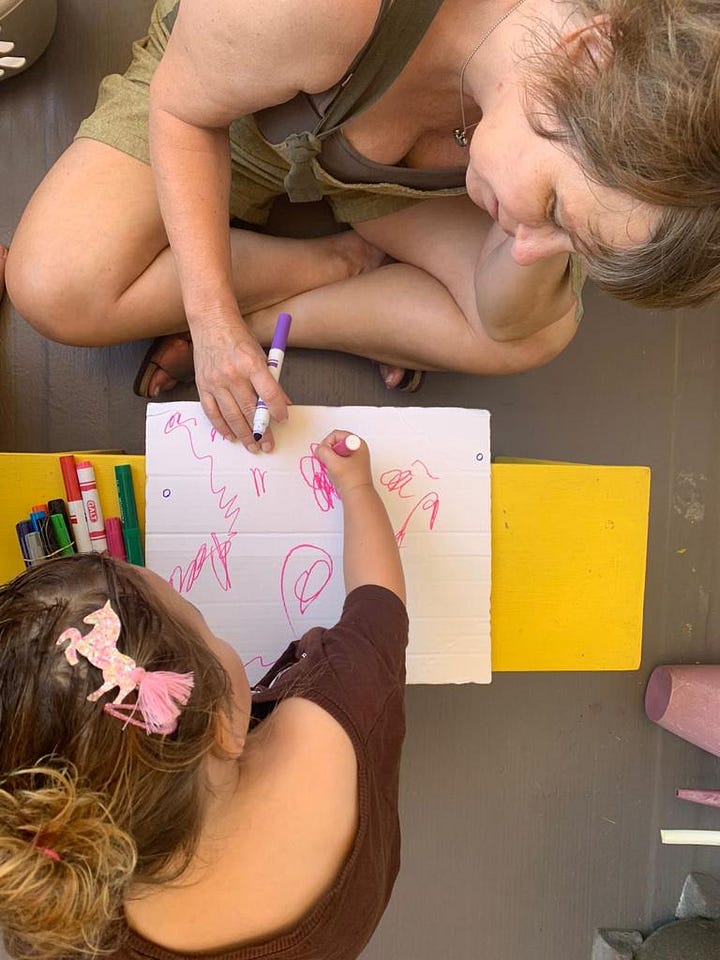Naming things
Did you know that the week between Christmas and New Year’s has all kinds of names?
Twixtmas, Chrimbo Limbo, Dead Week, The Fallow and Witching Week are some of them.
Weird how when you discover something has a name, it solidifies. Some mystery dissolves.
Naming is assignation: a thing is this, so it is no longer that, or that, or a combination of that this and those thats.

Little visitor
Paikea came to visit on Christmas Eve in the morning. Her hair was slicked into a tiny ponytail because her parents hadn’t managed to wash all the Vaseline out she’d studiously rubbed into it earlier.
Pai always arrives shy, quiet and curious. She peeks around doorways by tilting her body and head to peer into rooms, warily checking whether they have occupants before entering them slowly. Then she looks up and around and begins her adventure with an inspection with the most mysterious object in there.
‘What’s that?’ she’ll ask. You hand her the plant mister and show her how it works, and she tries to mist the plants and says ‘I can’t,’ when she struggles to push the plunger all the way down with her tiny two-year old hands. She’ll keep trying until some water sprays out, then she’ll hop up and down and laugh, and try again. Then she’ll set the thing down with a little sigh—satisfied, one could call it—and move on to the next thing.
‘Where are the photos?’ (They’ve been moved.)
‘Where is the angel for the top of the tree?’ (We haven’t put it on yet.)
‘Read it!’ (She scrambles on to my lap and we read the book.)
Pai’s strapping big brother, two days short of 24, pulled a classic adult-child move and called to ask if he could bring his washing around because the new digs he is in doesn’t have a machine yet. His mother—me—pulled a classic move and said ‘Sure,’ as though Christmas Eve wasn’t already busy and the flat full of people and activity. I even said ‘Leave it, I’ll do it.’
Christmas spirit and all.
He brought around a basket and left to do the last-minute things of Christmas Eve.
I said to Paikea, ‘Will you help me with the washing?’ She said ‘Yes!’ and jumped up and then bent her body down and threw her arms back as though she was about to dive into a pool.
She opened the washing machine door and, while I washed fruit or did some other job, she began to empty out Ollie’s washing basket. It stood about two meters away from the machine, but it didn’t occur to her to make her job easier by bringing it closer.
She took little bundles and squashed them in. ‘In you go,’ she piped.
There were about five trips to the basket and back, and about three to pick up dropped socks. Every time she put something into the machine she said, ‘In you go!’
When we hung the washing, she took one sock at a time to the line she could reach, tried to pry open a peg, managed, but couldn’t hold it open long enough to clip the sock to the line, then turned it around and ‘pegged’ the sock with the open end.
The whole time, she sang, ‘Hanging washing, hanging washing, hanging washing.’
Pick a moment
In my early twenties, I read an article in a magazine—I think it was Cosmopolitan—about a philosophy of happiness that required you to be thinking about the thing you were busy with while you were busy with it. So you would say to yourself: ‘I have woken up.’ Then you would say, ‘I’m getting up now.’ Then you would say, ‘Now I’m boiling the kettle.’ The same article, I think, suggested that when you bath, you stay in the bath after you pull the plug until all the water has drained away.
The point was for each thing to unfold in its own time, and for you to be aware of its unfolding. Just aware. Not analytical.
A decade later, a friend of mine gave me a book called The Power of Now by Eckhart Tolle. I found it boring and zealous. The idea—that to live in this moment was the answer to all of life’s problems—felt abstract and theoretical.
In any case, at that point I was dealing with hyperthyroidism—which is like being on speed—with a baby and a toddler and an entirely absent partner. In every moment, there were several moments to be in, and I didn’t have the wherewithal to choose which the right one was: finish breastfeeding the baby, open the gate for the electricity metre reader, or comfort the boy who had accidentally crashed his Lego construction into the wall his excitement to show it to me.
The older I got, the more I read, the more familiar I became with the idea of ‘living in the moment’.
But was always only a concept, codified by spiritual leaders, but consistently and stubbornly vague.
This year though, something happened that snuck me out of a previous way of apprehending life.
I still think and plan. I still remember and try to make meaning of past events.
But I feel less invested in my thinking, planning, remembering and meaning making. These actions are like clouds that pass in the sky. I notice them. I watch them morph.
I did not train myself to do this.
I wasn’t shooting for enlightenment.
I didn’t come back from my eight months of being out of my life bearing gifts of knowledge I can share in soundbites. I don’t know why this happened; whether it was escaping my predictable routine, or not having to drive, or walking 1 300km.
Maybe it was not having paid work for several months and going beyond freak-out to acceptance.
Or maybe it’s an age thing. If this level of sang-froid were accessible at the age of 27 or 38 or 49, we would not have the opportunity grow into calmness.
And then the only thing to look forward to about getting older would be thinner hair and surprise farts.


When Paikea and I had finished our things, we took out the Kokis and did some drawing on the stoep. A gust toppled a watering can and startled her. She looked at it wobbling on the floor and then carried on drawing.
‘Don’t be afraid,’ she said to me, or to herself, ‘It’s only the wind.’
And we carried on making scribbles, making scribbles, making scribbles.
Happy new year to you.
Keep on making scribbles.
Lots of love,
K.




I'm so glad there's more to life than thinner hair and surprise farts. When I slow down the world can be a magical place.
Best wishes for 2024!